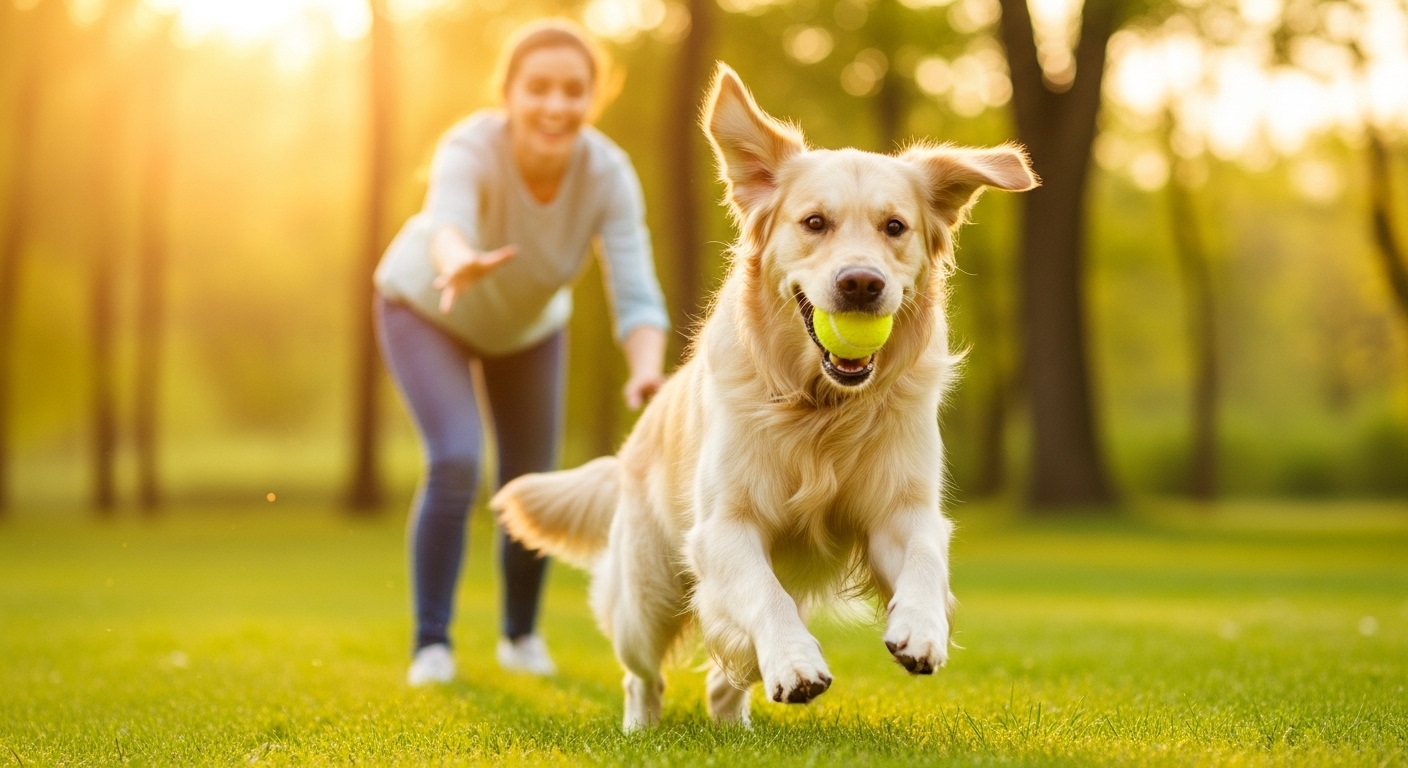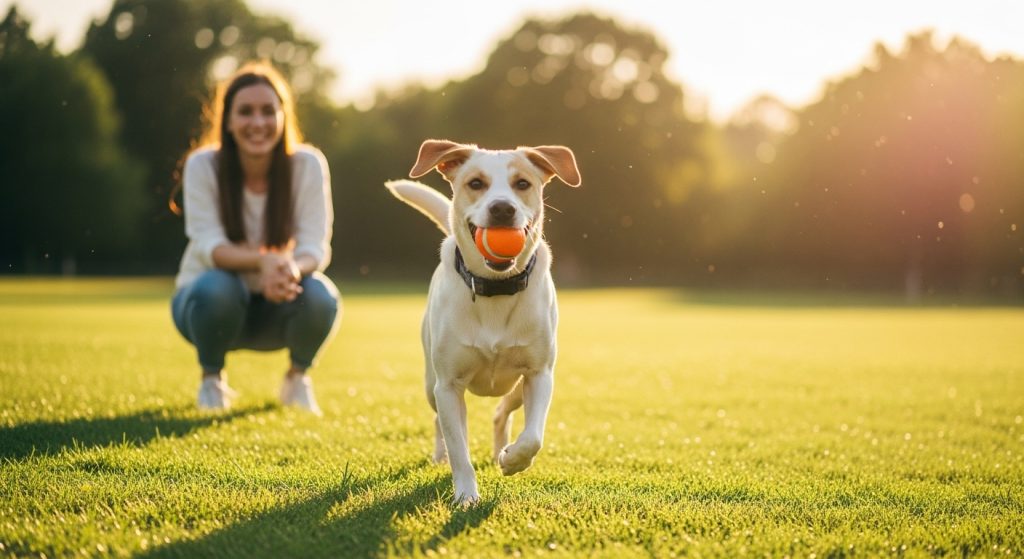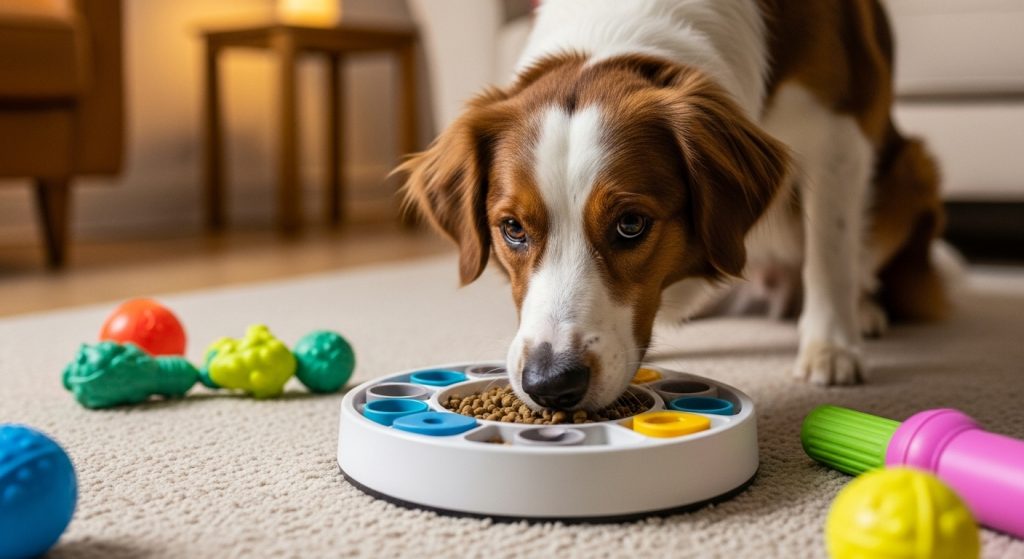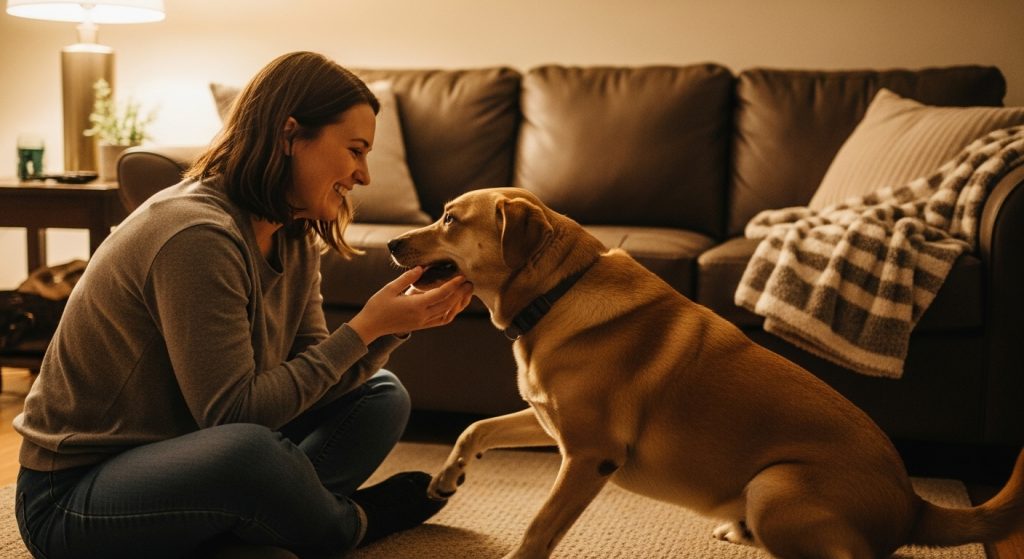When your dog excitedly wags its tail at the sight of a ball, rope, or squeaky toy, something magical happens — not just physically, but mentally too. Daily playtime for your dog’s mental health isn’t a luxury; it’s essential.
Beyond burning energy, play helps dogs develop focus, emotional stability, and a sense of connection with their humans. Just as humans benefit from hobbies and exercise, dogs thrive on play as a key ingredient to emotional wellness.
This post explores three powerful dimensions of how daily play impacts your dog’s mental health:
-
Emotional balance and stress reduction
-
Cognitive and behavioral development
-
Bonding and trust between you and your furry companion
Each part concludes with a Whisk AI image prompt to visualize the joy of playtime.
Emotional Balance: The Happiness Hormone Effect
Dogs, like humans, experience stress, boredom, and anxiety. When left unchecked, these emotions can manifest as destructive behavior, restlessness, or depression. Regular play sessions are nature’s way of keeping your dog’s emotions balanced and content.
A. How Play Reduces Stress
During play, dogs release endorphins — natural “feel-good” hormones. Whether it’s a chase, tug-of-war, or a puzzle toy, this physical engagement releases tension and helps eliminate built-up stress.
Scientific studies show that play reduces cortisol levels (the stress hormone) and increases oxytocin — the same hormone responsible for feelings of love and trust. This chemical balance helps dogs stay emotionally stable, even in stimulating environments.
B. Combating Boredom and Anxiety
Many behavioral issues stem from mental under-stimulation. Dogs left alone for long hours without enrichment can develop separation anxiety or destructive habits like chewing furniture.
Daily playtime gives them a positive outlet for that energy, replacing anxious behaviors with joyful, purposeful activity. Even short 15–20 minute sessions twice a day can dramatically reduce anxiety levels in dogs of all breeds.
C. A Natural Antidepressant
Dogs can feel sadness too — especially rescue dogs or those with traumatic backgrounds. Play provides an emotional reset. The laughter, movement, and interaction create consistent, predictable moments of joy that help them rebuild confidence.
Example: Rescue shelters often introduce structured play sessions for anxious dogs to help them regain trust and reduce depression.
D. Restorative Routine
Establishing daily playtime routines also gives dogs a sense of security. Knowing when and what to expect reduces unpredictability, which is a major cause of stress.
Tip: Play at roughly the same times each day — morning before work, and evening after dinner — to create stability and happiness.
Cognitive Growth: Play as Brain Training
Beyond joy, play is an incredible mental exercise. It challenges your dog to think, solve, and adapt — crucial traits for a sharp, confident pup.
I. Problem-Solving Through Play
Interactive games like treat puzzles or hide-and-seek stimulate your dog’s problem-solving instincts. They learn cause-and-effect logic — pressing, sniffing, or pawing to get rewards.
Why it matters: This keeps their mind sharp and delays cognitive decline as they age. Senior dogs, especially, benefit from daily mental challenges to maintain brain function.
II. Focus and Impulse Control
Play can teach discipline disguised as fun. Games like fetch, “wait and release,” or controlled tugging help your dog practice self-control. They learn to follow cues and delay gratification, improving obedience and patience.
Example: Before throwing a ball, ask your dog to “sit.” Release them only after they make eye contact. It transforms simple play into an enriching training session.
III. Sensory Enrichment
Dogs experience the world through smell, sound, and touch. Engaging their senses with toys that crinkle, squeak, or smell interesting keeps them mentally sharp.
Try:
-
Scent-based games using hidden treats
-
Textured chew toys
-
Outdoor exploration walks combined with fetch
These small moments build cognitive pathways, making your dog more alert and emotionally fulfilled.
IV. Reducing Cognitive Decline in Senior Dogs
As dogs age, their mental agility declines. Daily playtime acts as a natural cognitive therapy. Research shows that mentally engaged older dogs maintain memory and problem-solving skills longer than sedentary ones.
Simple senior-friendly activities:
-
Slow puzzle feeders
-
Gentle hide-and-seek with soft toys
-
Nose work games (hide treats under cups)
By keeping the brain busy, you’re protecting their emotional and mental health for years to come.
Strengthening the Human-Dog Bond
Perhaps the most beautiful benefit of daily playtime is its power to deepen your bond with your dog. Play isn’t just an outlet; it’s communication, trust-building, and love expressed through joy.
A. Building Trust and Connection
Dogs see play as a social interaction. When you engage in games with them — tugging, chasing, fetching — you become part of their “pack behavior.” This reinforces trust and affection.
For new dogs: Consistent play helps them adjust to your home faster. It signals safety, reliability, and kindness.
B. Strengthening Communication
Play improves non-verbal understanding. Dogs learn your gestures, tone, and timing — and you, in turn, learn to read their body language. This makes training smoother and enhances mutual respect.
Pro Tip: Use positive reinforcement (like treats or praise) during play to reinforce good behavior naturally.
C. Physical and Emotional Synchrony
When you move, laugh, and engage together, your dog mirrors your emotions. The synchronized joy of play releases oxytocin in both of you — deepening your emotional connection.
Studies show: Pet owners who play daily have dogs that display fewer stress signals and more affection.
D. Ending Play with Calm Energy
Structured play doesn’t mean chaos. The best sessions end with calmness — signaling to your dog that playtime has a clear start and end. This teaches emotional regulation.
Example: End with a “sit” command, a calm praise, or a cuddle. It tells your dog, “We had fun, now it’s time to relax.”
E. Quality Time, Not Quantity
You don’t need endless hours. What matters is focused attention. Even 20 intentional minutes of tug, fetch, or scent work strengthens bonds more than passive companionship all day long.
The secret is presence — when you’re engaged, your dog feels it deeply.
Play as a Path to Emotional Wellness
Daily playtime for your dog’s mental health isn’t optional — it’s essential. It keeps your pup emotionally balanced, mentally sharp, and deeply bonded to you.
Through consistent, meaningful play, you nurture your dog’s joy, confidence, and trust — creating a cycle of happiness that benefits both of you.
So, grab that toy, step into the sunshine, and let every game be a moment of love, laughter, and healing. Because in your dog’s world, playtime is happiness — and happiness is health.




